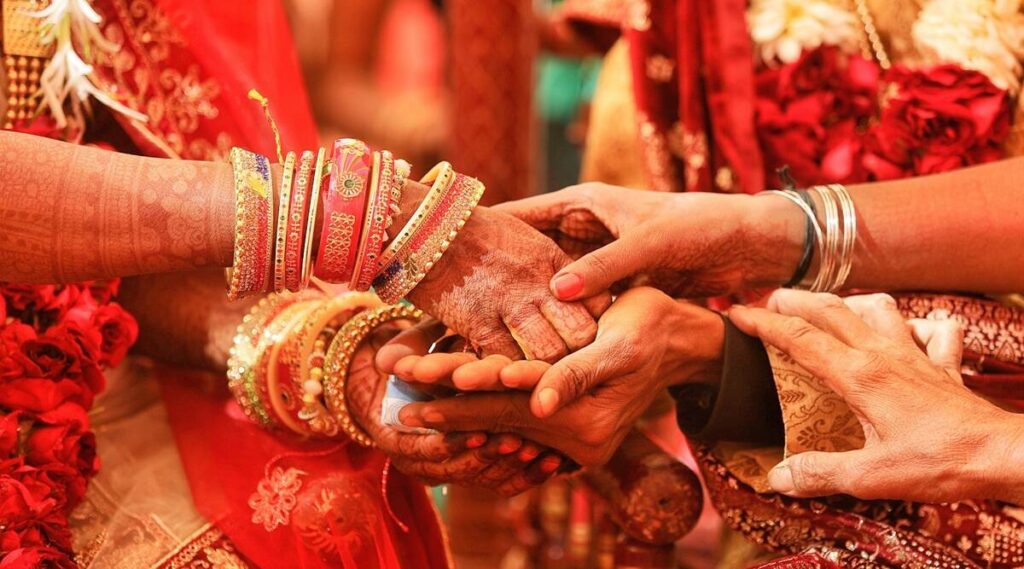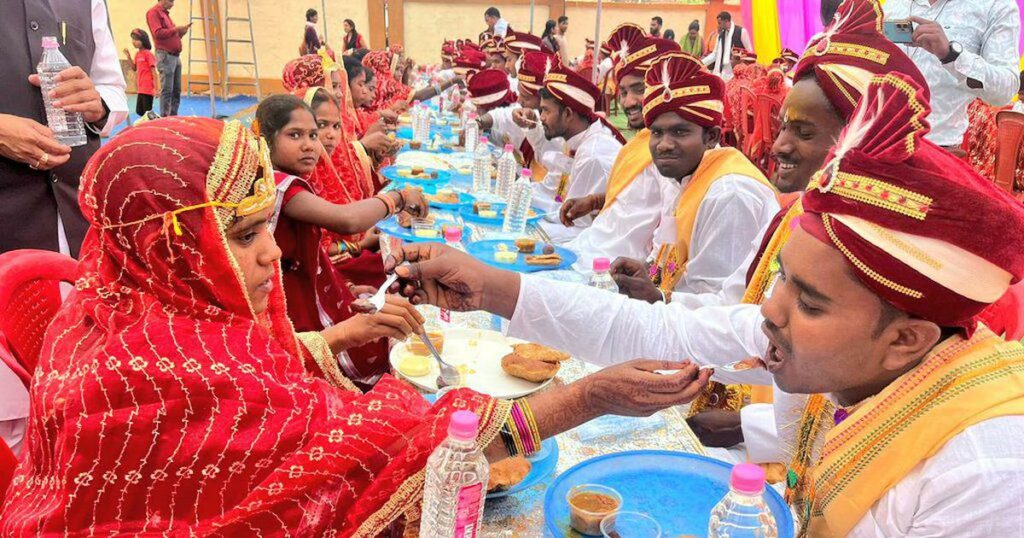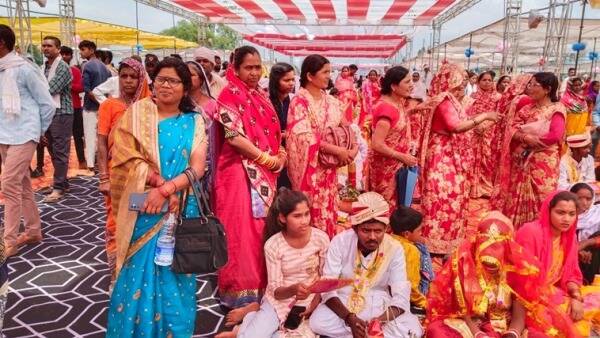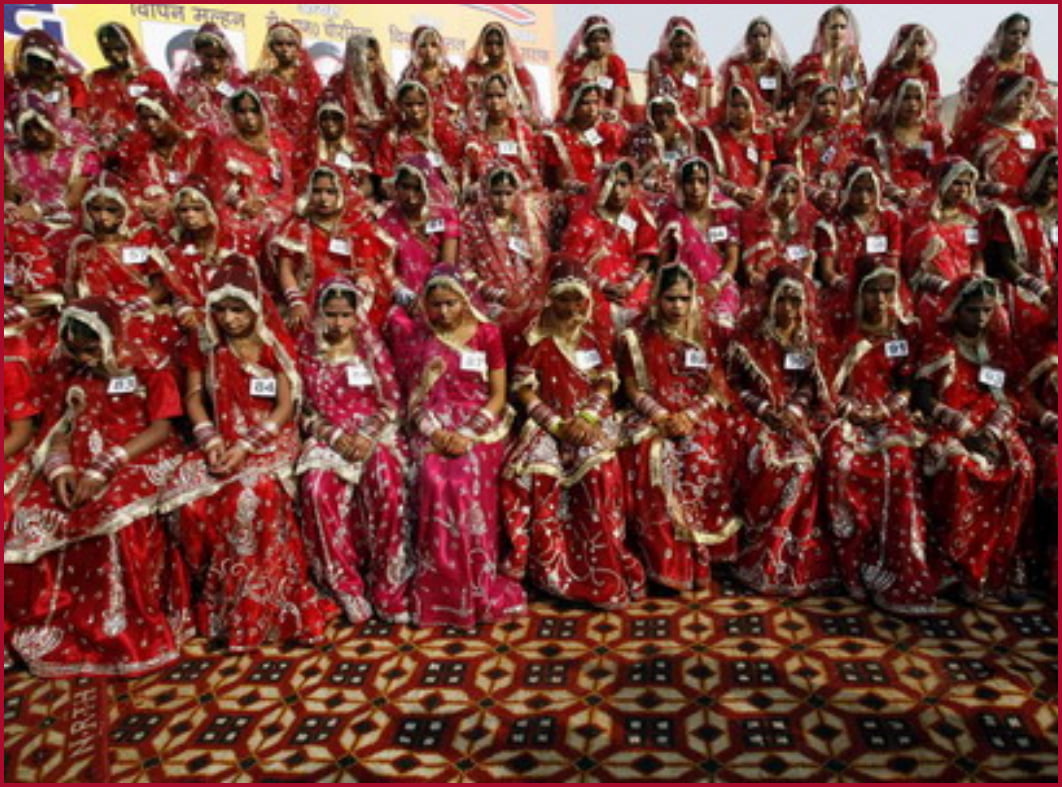The Madhya Pradesh government has asked over 200 women in the Dindori district to take pregnancy tests for checking their eligibility for a scheme that provides a grant of Rs 55,000 to couples. The scheme being questioned is the Mukhyamantri Kanya Vivah Yojana under which the government gives Rs 49,000 to each woman eligible for marriage and spends another Rs 6,000 on each couple for arranging a mass marriage ceremony. This issue was reported by the opposition, Congress party, on Sunday.
The mass marriage of 220 girls under the Mukhyamantri Kanya Vivah Yojana was scheduled in the Gadsarai area of Dindori district on Saturday. But the marriage of five girls wasn’t solemnised as they were found to be pregnant as per the findings of a urine test to determine their pregnancies.
Why would the pregnancy test be conducted in the first place?
In an interview with the Indian Express, the Dindori district collector Vikas Mishra, however, said as per standard parameters the tests for sickle cell anaemia (a genetic disorder reported much among tribals) were carried out on all. During those tests, it was found that five girls had missed their menstrual cycles.

“Subsequently the doctors carried out the urine tests of the five girls, which established that they were pregnant. We then enquired about it, after which they told the staff that they were already married,” Mishra claimed.
The Dindori chief medical and health officer (CMHO) Dr Ramesh Marawi confirmed that pregnancy tests of some girls were conducted. “Tests are conducted for age verification, sickle cell anaemia and to ascertain overall fitness. Pregnancy tests were conducted at the behest of higher authorities on some girls whose cases were suspected.”
As per the scheme, for a bride/groom to get married under the scheme, a) the bride/ bride’s parents should be a native of Madhya Pradesh, b) the bride should attain the minimum legal age of 18 years for marriage and the groom must attain the minimum legal age of 21 years for marriage, c) the divorced women who have legally obtained a divorce and d) here is no income limit for beneficiaries to receive assistance under the scheme, but it is necessary that the beneficiary participates in the group wedding program organised on the specified dates to complete the marriage. The benefits of the scheme will not be available in the case of individual marriages.
The Congress MLA from the Dindori, Omkar Singh Markam tweeted a video asking some important questions to the state government. “ The test which has been conducted to assure the marital status of woman, what are the criterias to it? If there’s a rule, it should be stated openly. Please make the rules/ criteria that you have set for the virginity/ pregnancy test public.“
The politician also said that four women whose pregnancy tests came out positive were not given benefits under the scheme, as reported by The Indian Express. “This is a violation of their basic rights and an invasion of their privacy,” he adds. “I will raise this issue before the chief minister as well as the prime minister.”
What does the scheme say?
As per the scheme, for a bride/groom to get married under the scheme, a) the bride/ bride’s parents should be a native of Madhya Pradesh, b) the bride should attain the minimum legal age of 18 years for marriage and the groom must attain the minimum legal age of 21 years for marriage, c) the divorced women who have legally obtained a divorce and d) here is no income limit for beneficiaries to receive assistance under the scheme, but it is necessary that the beneficiary participates in the group wedding program organised on the specified dates to complete the marriage. The benefits of the scheme will not be available in the case of individual marriages.
The scheme does not mention or suggest any measure to check the marital status of women, especially regarding the pregnancy test.

Even if the administration were interested in knowing the marital status of women, how the marital status of women is influenced by the logic of pregnancy is unclear. This practice perpetuates women to invasive and degrading testing. It also reinforces unequal power dynamics between men and women, as men are not subject to the same scrutiny and judgment based on their sexual and reproductive choices.
Feminists have long argued that the idea of female chastity and purity is a patriarchal construct that has been used to control and subjugate women. Former Chief Minister and Congress leader Kamal Nath also criticised the state administration for conducting the pregnancy tests.
The incident of conducting pregnancy tests for marriage grant beneficiaries in Madhya Pradesh is a clear example of the social stigma and stereotypes that continue to surround women’s sexuality. This stigma assumes that women’s bodies and sexual activity must be regulated and monitored by society, which undermines bodily autonomy and reproductive rights. The incident reinforces the notion that only pregnancy after marriage is acceptable.
“If this news is true, then on whose orders was this gross insult done to the daughters of Madhya Pradesh,” Nath said on Sunday. “Do the daughters of the poor and tribal communities have no dignity in the eyes of the chief minister?” The senior Congress leader demanded a high-level inquiry into the matter. “This is not only a matter of pregnancy test, but also of a malicious attitude towards women,” he said.
However, the BJP district chief Avadh Raj Bilaiya denied the opposition’s argument and said that the tests were done to check health issues such as sickle cell anaemia, reported MP Tak, a local news platform. He also said that few women, who were found pregnant during the medical test, were assumed to be married and so were not provided with the benefits.

The incident of conducting pregnancy tests for marriage grant beneficiaries in Madhya Pradesh is a clear example of the social stigma and stereotypes that continue to surround women’s sexuality. This stigma assumes that women’s bodies and sexual activity must be regulated and monitored by society, which undermines bodily autonomy and reproductive rights. The incident reinforces the notion that only pregnancy after marriage is acceptable.
bell hooks, in her book Feminism is for Everybody, says that “The dominant culture in society is one that privileges men and oppresses women. This system is maintained through institutions like marriage, which reinforce gender roles and restrict women’s autonomy“. hooks also argues that feminism must work to dismantle these systems of oppression and empower women to make choices about their own bodies and lives; which seems relevant in today’s India where women are under surveillance and denied the right to choose.
About the author(s)
Anuj is an urban practitioner and an independent writer. He's mostly interested in Feminist Urbanism and the intersection of various identities in the urban. He is a graduate of the Indian Institute for Human Settlements and has disciplinary training in Urban and Regional planning.




